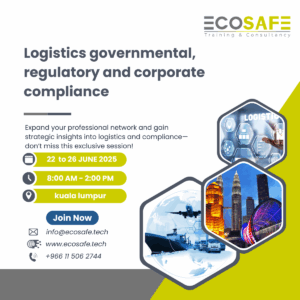Kuala lumpur – Malaysia
- Home
- All Courses
- Training By Category
- logistics, purchasing & supply chain management
- Logistics governmental, regulatory and corporate compliance
Logistics governmental, regulatory and corporate compliance

Course Description:
In today’s highly regulated logistics environment, understanding and complying with governmental, regulatory, and corporate requirements is critical to maintaining operational efficiency, minimizing risks, and protecting the organization’s reputation.
This training program is specifically designed to equip logistics and operational leaders with the knowledge and tools needed to manage compliance effectively.
Participants will explore the significance of regulatory compliance, learn to assess the cost implications of compliance issues, and master strategies for monitoring and managing compliance within shipping and handling operations.
Who should attend:
This course is designed for:
- Senior Shipping Supervisors
- Senior PH (Plant/Production Handling) Operators
- Logistics Managers and Staff
- Warehouse and Distribution Supervisors
- Anyone involved in shipping, handling, and logistics compliance activities
Course Outline:
Module 1: Introduction and Detentions
- Introduction
- Logistics Activities Vs. Supply Chain Management
- Components of Logistics’ activities
- 9 Rs of Logistics
- Introduction to Warehouse Management
- Introduction about Transport Management
- Introduction of transportation laws (DOT in the U.S., ICAO for air, IMO for maritime).
- Introduction to Freight Forwarding Services
- Internal audits for logistics operations.
- Summary and Conclusions
Module 2: Governmental Compliance and Regulatory Compliance Fundamentals
- Introduction to regulatory compliance in supply chain and logistics.
- The importance of compliance in Logistics, shipping and handling operations.
- Risks and consequences of non-compliance in operational environments.
- Corporate compliance within governmental sector
- Hazmat rules for hazardous materials.
- Trade sanctions and export control laws.
- Data protection laws (if logistics involve personal/customer data).
- Summary and Conclusions
Practical Focus: Real-world examples of compliance failures in shipping and handling.
Module 3: Regulatory Bodies and Core Standards
- Introduction
- Overview of key compliance areas
- Overview of key government and regulatory agencies (local and international).
- Key compliance regulations: customs, transportation, environmental standards.
- Workplace health and safety standards applicable to logistics operations.
- Customs regulations and import/export laws
- Transportation safety standards (e.g., FMCSA, DOT)
- Environmental regulations (e.g., emissions, waste disposal)
- Labor laws and worker safety (e.g., OSHA)
- Industry-specific regulations (e.g., pharmaceutical, food safety)
- International standards (e.g., ISO, WTO agreements)
- Trade sanctions and embargoes
- Data protection and cybersecurity regulations (e.g., GDPR)
- Summary and Conclusions
Module 4: Cost Implications of Non-Compliance – Corporate Compliance
- Introduction
- Internal policies and procedures
- Ethical sourcing and sustainability practices
- Direct and indirect costs associated with compliance failures.
- Case examples: calculating the financial impact of shipping violations or mishandling.
- Building a business case for investing in compliance programs.
- Risk management and audit protocols
- Compliance training and employee accountability
- Summary and Conclusions
Module 5: Monitoring Compliance at the Operational Level
- Introduction
- Best practices for monitoring compliance in shipping and handling operations.
- Using compliance audit tools and checklists.
- Defining and tracking key compliance-related KPIs.
- Summary and Conclusions
Module 6: Challenges and Risks – Managing Compliance Issues Proactively –
- Introduction
- Navigating global regulatory differences
- Technological disruptions and compliance adaptation
- Identifying and investigating compliance breaches.
- Developing corrective and preventive action plans.
- Building a proactive culture of compliance within operational teams.
- Supply chain visibility and third-party compliance
- Penalties for non-compliance
- Summary and Conclusions: The strategic value of strong compliance in logistics
Module 7: Real-Life Scenarios and Conclusion
- Introduction
- Interactive review of real-world compliance incidents.
- Group activity: Developing an action plan to address a compliance breach.
- Lessons learned and practical takeaways for day-to-day operations.
- Future trends in compliance and logistics
- Vendor compliance (ensuring suppliers meet company standards).
- Sustainability practices.
- Summary and Conclusions: Future trends in compliance and logistics
Course Features
- Duration 5 Days
- Activities Kuala lumpur – Malaysia
- Course Code PSC 58
- Date From 22 to 26 June 2025
- Location kuala lumpur - malaysia
You May Like
Accounting, Decision Making & Financial Communication
- Date: 2 Feb 2025
- Location: Cairo-Egypt
Accounting and Comparison of IFRS and GAAP
- Date: 12 Jan 2025
- Location: Sharm-Elsheikh, Egypt
Certified HACCP professional (CHP) Food Hygiene & Food Safety Management
- Date: 2 Feb 2025
- Location: Online

